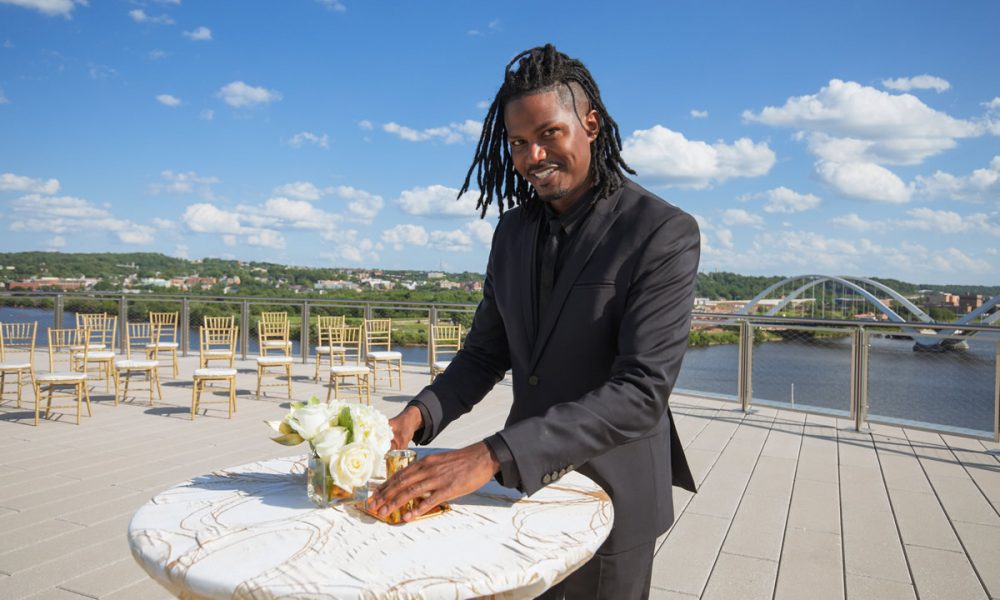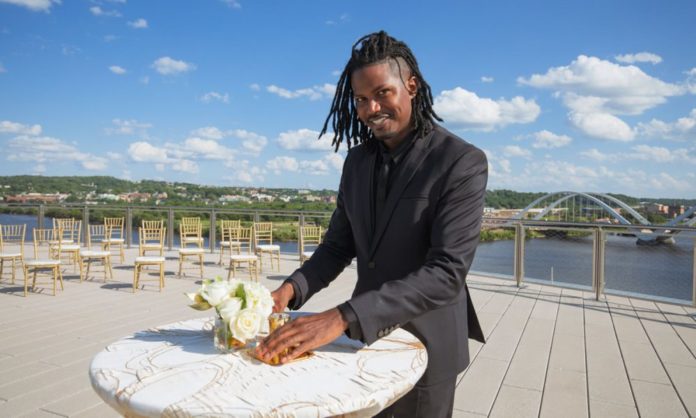
(Editor’s note: This is the third in a multi-part summer series of stories taking a closer look at how a group of diverse LGBTQ entrepreneurs survived and thrived during the pandemic. The series is sponsored by the National LGBT Chamber of Commerce. All installments in the series are available on our website.)
LGBTQ seniors visiting a community pharmacy in Northern California and anxious about getting the “jab” are often soothed by Allie, a 15-year-old Australian Cattle Dog mix who works there alongside her dads.
“We’re all like a big family,” said Dr. Clint Hopkins, a pharmacist and co-owner of Pucci’s Pharmacy in Sacramento with his husband, Joel Hockman. “We want to ensure that our staff and patients remain safe and healthy. Patients can feel that in our culture and that makes it a more welcoming place for them.”
Though he admits some people stop by “just to pet the dog,” that’s fine by him, too.
Hopkins and Hockman wear many hats besides CEO and COO of their independently owned pharmacy, and often it means working long hours to manage dozens of employees and hundreds of regular customers requiring expensive and specialized medications, such as HIV treatments and antipsychotic medications, but they said it’s worth it to keep from turning anyone away.
“We’ve had people from everywhere that were denied medication from someone somewhere,” Hopkins explained. “We literally don’t judge them. And we ‘untrain’ any of those things in our staff that they may have learned – any societal construct or something their family may have taught them. It’s not our job in any way to pass any judgment on anyone.”
Hockman agreed, adding: “Medication is a necessity and not an option for people to stay safe.”
This founding belief in serving everyone without judgment is what helped their small business grow during the height of the pandemic, even as the economy was collapsing into a recession in 2020.
Even as other businesses shuttered from the strain of lockdowns and lost business, Pucci’s Pharmacy expanded the delivery service it previously offered as well as its contactless and curbside services. They also worked with the Sacramento County Public Health vaccine distribution program.
As a result they tripled their business, resulting in an expansion to a larger space in 2021.
“In order to be competitive, you have to think out of the box,” Hockman explained. “What are the customers’ expectations? How are they expecting to receive your products or services during a pandemic? For our business, people were going to be more reluctant to come into the store. At the pandemic’s height, we were also limited by who could physically come into the store.”
So, the pair adjusted their business during the crisis to meet the changing safety needs of their community. This was in part because they knew the important role the pharmacy played in their community, particularly for those who are more vulnerable.
Pucci’s Pharmacy has been a Sacramento fixture for almost 90 years, since brothers Peter and Dino first set up shop in 1930. Their former employee, Tom Nelson, bought the pharmacy with his wife, Linda, in 1979.
When the AIDS epidemic swept the region and eventually the world in the 1980s, Nelson provided critical medications and affirming care at a time when some pharmacies were still denying both to HIV patients.
Hopkins and Hockman bought Pucci’s in 2016 and continue its welcoming legacy.
Today, research shows LGBTQ seniors are particularly medically and economically vulnerable due to a history of discrimination, and they, like seniors in general, increasingly rely on local pharmacies to meet their healthcare needs.
These vulnerabilities were exacerbated by the pressures of the pandemic, and may have contributed to Pucci’s rapid expansion.
The unemployment rate for those 65 and over more than quadrupled between March and April 2020, during the height of the lockdowns and the economic downturn, according to the U.S. Department of Health and Human Services.
Even before the pandemic, 94% of seniors were covered by Medicare, and SAGE, the LGBTQ seniors advocacy organization, states many LGBTQ older people in particular “struggled with poverty.”
SAGE found LGBTQ seniors were twice as likely to be single and live alone, and were four times less likely to have children. The Center for American Progress also reported LGBTQ seniors were more likely to rely on federal benefits such as the Supplemental Nutrition Assistance Program (SNAP), Medicaid, subsidized housing assistance, and unemployment insurance.
Aaron Tax, director of advocacy at SAGE, told the Blade his organization witnessed many LGBTQ seniors relying on groups serving aging populations “to deliver life-saving help” as “financial resources dried up and the safety net was stretched thin.”
But at the height of the crisis, SAGE often delivered critical services unfunded and without reimbursement, such as SAGEConnect, which was launched to connect socially isolated LGBTQ older people across the country.
“LGBT organizations cannot do this work alone,” Tax said.
A Canadian study found pharmacies, in particular, to be “perfectly positioned” to work with elderly patients, their doctors, and their caregivers to best manage their care.
According to the report, pharmacists as “medication experts” often monitor prescriptions from multiple doctors and inform the patient about what each is supposed to do as well as what side effects and interactions to watch out for. They can also simplify a treatment plan for “maintaining a quality of life” for senior patients.
“Lowering stress for anyone is critical,” Hockman said regarding changes they instituted during the pandemic.
“Stress increases the possibility for illness to set in,” he explained. “Everything we deliver to the customer reduces that stress level as much as possible. Like offering curb services so people don’t have to go into the store if they aren’t comfortable.”
While Tax stated it was important for LGBTQ seniors to feel welcome in all businesses, it was important for those providing healthcare services. Otherwise, LGBTQ seniors might delay or even avoid seeking the critical care they need.
According to the Williams Institute, LGBTQ older adults avoid or delay healthcare fearing discrimination. Data from their 2016 study also found a legacy of barriers to housing, employment and social programs continue to put LGBTQ seniors, particularly those who also identify as people of color, at greater risk.
“If businesses pay a little bit more attention to LGBTQ older people,” Tax explained, “they can help LGBTQ older people overcome the history of stigma and discrimination that they have faced.”
The National LGBTQ Chamber of Commerce points out this can be good for the economy as well.
The group’s 2017 economic report stated LGBTQ consumers spend $917 billion every year on goods and services, which is part of the $1.7 trillion LGBTQ-owned businesses like Pucci’s Pharmacy contribute to the U.S. economy annually.
Hopkins and Hockman advised college-aged LGBTQ community members who were considering starting their own business to serve everyone, meet client expectations, and to not be afraid to show their support for the LGBTQ community in their advertising.
“I’ve had patients that aren’t LGBTQ but come to us because their family member is, and we support the community,” said Hopkins, who also served as the president of their local LGBTQ Chamber of Commerce during the pandemic shutdowns. “So, let people know you’re supportive and out there.”
Although the couple enjoys their down time cycling or relaxing over dinner and wine with family and friends, they stressed they don’t have as much free time as they would like to mentor students.
But they agreed they would make time for an enterprising “go-getter” who offers to intern with them by saying, “Here are the things I have learned through my education or experience, and here are some things I can do to help you.”
“We make local decisions and make a greater impact on our community,” Hopkins said. “We take a very strong interest in the lives of our team members. We look out for one another.”
They both welcomed the chance to see their business family continue to grow.
“And it does feel like a family environment,” Hopkins said.








